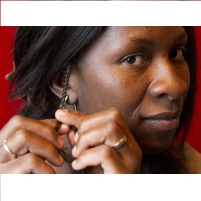Hair-Braider Sues over Utah Law Requiring Cosmetology License
Saturday, April 30, 2011
 Jestina Clayton (photo: Jim Urquhart, Associated Press)
Jestina Clayton (photo: Jim Urquhart, Associated Press)
Jestina Clayton is suing the state of Utah for requiring her to get a cosmetology license so she can weave hair—something she claims is unconstitutional.
A refugee from Sierra Leone, Clayton says she was told by a state regulator two years ago that she would not need licensing for her part-time work, since her traditional African hairstyling does not involve chemicals or cutting. Then, last year, she discovered her business was illegal unless she obtained a cosmetology license. But getting a license requires taking about 2,000 hours of coursework, at a cost ranging from $9,000 to $18,000 in tuition. Clayton makes less than $5,000 a year braiding hair.
With the help of the libertarian Institute for Justice, Clayton has filed a lawsuit to force the state to change its cosmetology law. Mississippi did just that in 2005, by amending its statute as it pertains to hair-braiders.
Another 10 states, including California and Arizona, already exempt braiders from such laws.
-Noel Brinkerhoff
Hair Braider Says Utah Cosmetology Law Is Unfair (by Chi-Chi Zhang, Associated Press)
Woman Sues Over Need for License to Braid Hair (by Tom Harvey, Salt Lake Tribune)
- Top Stories
- Unusual News
- Where is the Money Going?
- Controversies
- U.S. and the World
- Appointments and Resignations
- Latest News
- Trump Renames National Football League National Trump League
- Trump to Stop Deportations If…
- Trump Denounces World Series
- What If China Invaded the United States?
- Donald Trump Has a Mental Health Problem and It Has a Name






Comments